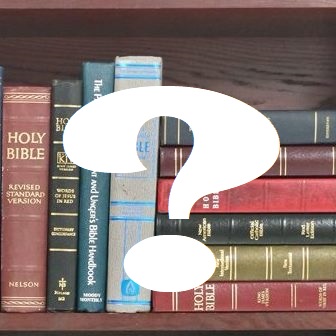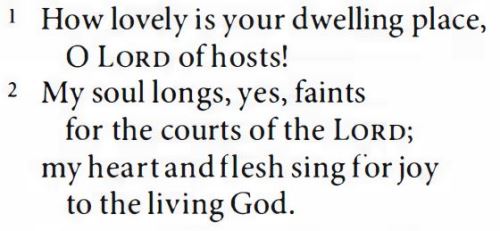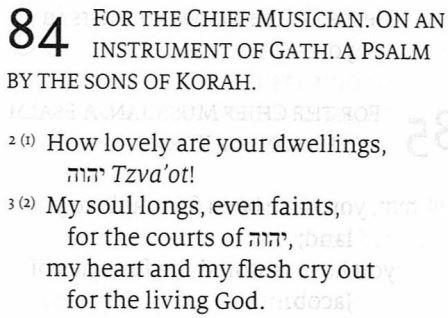A while back I was asked, “Can you please suggest the best Bible with Restored Names to read?” There certainly are a variety of Bibles used by Messianic and Hebrew Roots folks, and the debate over names can get pretty heated. So what would be considered the best Restored Names Bible?
Restored Names
First, we need to understand exactly what is meant by the term “Restored Names,” and it may not be the consistent across the broad spectrum of Bible readers. I’m going to focus on “restored names” in English Bible versions, since that is my native tongue. Presumably, the same thoughts would carry over to other languages, but I will leave that to those proficient in those other tongues.
Our Bibles come to us, in English, translated primarily from Hebrew and Greek. The Old Testament, or TaNaKh, usually is translated from the Hebrew Masoretic Text or the Greek Septuagint – the Septuagint being the Greek translation of a non-extant Hebrew text that is older than the Masoretic Text. The New Testament is translated almost exclusively from Greek texts, either from the Byzantine family of texts or the Alexandrian family of texts. It has been argued that at least some of the New Testament was originally written in Hebrew (or Aramaic). I won’t debate that here. What we have are Greek texts, and even if some of it was written in other languages, what we have in those languages today appears to have been translated from Greek.
For this one issue – restored names – there are two distinct issues to be addressed. First, are there proper names that once appeared in the text, or still appear in the source text, that have been removed or substituted in our English texts and therefore need to be restored? Second, are there names that are rendered differently in English than they are in the source texts that should be restored to their original form?
We will address the second question first.
English Rendering of Foreign Names
No doubt there are names in our English Bibles (and a lot of other places) that have been anglicized. This is a common practice for English speakers and readers. We read “Mark” and “Luke” rather than the Greek (or Latin) names “Marcus” and “Lucas” (although parts of the KJV use both forms). English Bibles tell about Joshua and Caleb, Elijah and Elisha, Daniel and Ezekiel. Those are all anglicized forms of Hebrew names with which we have become familiar.
And especially in Greek, the names could get really confusing. They change form depending on how the name is used. For example, “Mark” is “Markou” in the genitive form (Acts 12:12), “Markon” in the accusative form (Acts 12:25; Acts 15:37 & 39; and 1 Timothy 4:11), and Markos in the nominative form (Colossians 4:10; Philemon 1:24; and 1 Peter 5:13). Those changes occur with all proper (and common) nouns, including the name of the Messiah.
If you were in Israel listening to a newscast in Hebrew, you might hear the correspondent mention something about “Yerushalayim.” If you were listening to the same broadcaster giving the news in English, you would likely hear “Jerusalem.” Anglicizing a proper name is common and acceptable when moving from a foreign language to English.
In John 1:42, the Messiah gives Simon the name Cephas. Some English Bibles then say “which is translated, Peter” and some say “which means a rock (or stone).” “Cephas” is Aramaic. “Petros” is Greek (in nominative form). “Peter” is anglicized Greek. When Paul writes of Peter in his letters, he almost always calls him “Cephas.” (There seems to be an exception in two places in Galatians 2, where usage is inconsistent). So, what name should appear in our Bibles?
But Saul, who was also known as Paul, filled with the Holy Spirit, fixed his gaze on him…
Acts 13:9
Saul (Greek “Saulos” – at least, in the nominative form) was also known as Paul (Greek: Paulos). The first name is transliterated from the Hebrew “Shaul.” The second name is actually Latin, “Paulus.” The New Testament Biblical character was know by both names – he did not have a “name change.” So again, what name should appear in our Bibles?
The Name of the Messiah
We should begin by saying there is nothing “pagan” about the name Jesus. It has nothing at all to do with Zeus (no similarity in Greek spelling) or with a horse or any other animal. All such nonsense should be rejected by any serious Bible student. Repeating this stuff makes us look like fools.
“Jesus” is a transliteration of the Greek name, “Iesous.” That is the nominative form of his name in Greek. The Greek text also calls him “Iesoun” (accusative form) and “Iesou” (genitive form – don’t let anyone tell you “Yesu” is some kind of curse). As we know, his mother, a Hebrew woman, likely never called him Iesous. “Iesous” is the Greek translation/transliteration of the Hebrew name Yehoshua, anglicized as Joshua. To confirm this, just look up the name of the sixth book of the Old Testament in the Greek Septuagint.
So, going from Greek to anglicized English, we use the name Jesus. If we were going from Hebrew to anglicized English, a better choice would be Joshua. See how confusing that could be? The KJV even makes a huge error in Hebrews 4:8 by calling Joshua, the successor to Moses, “Jesus!”
“Yahshua,” “Yahushah,” “Yahushuwa,” and a host of other spellings and pronunciations are all made up words within the Sacred Name movement. None of them have any basis in Hebrew, Chaldean, Aramaic, Greek, Latin, or Klingon.
Yeshua is a shortened form of the name Yehoshua and was common in both Hebrew and Aramaic. “Yeshua” never appears in the Greek New Testament. It is always Iesous, Iesoun, or Iesou. So, once again, what name should appear in our Bibles?
Up to this point we have been considering names that are rendered differently in English than they are found in the source texts. Now we will consider the situation where a name appears in the source text but something else has been substituted in the English text.
The Divine Name
In most English Bible translations, there is only one proper name that appears in the source texts but has been substituted with a replacement word in English. Of course, that is the Divine Name, the Tetragrammaton (a Greek word meaning “four letters”), the name known by the Hebrew letters Yod-Hey-Vav-Hey, יהוה. Most English translations follow the Jewish tradition of not pronouncing the Divine Name, and thus not writing it so that it could be pronounced.
The most common substitution is the word “LORD” printed in Small Caps (first letter a full-size capital letter, the remaining letters somewhat smaller capital letters). “Lord” is an English translation of the Hebrew title “Adonai,” and many Messianic Bible translations, like the Complete Jewish Bible or Tree of Life Version, substitute “Adonai” for the Divine Name. Many Jewish translations such as the Stone Edition Tanach substitute “Hashem,” a transliterated Hebrew word meaning “The Name.”
Restoring the Divine Name into English translations where it is shown in the source text should be a very simple thing to do, but in reality it is not. We know, or at least believe that we know, the four Hebrew letters that make up The Name. But the pronunciation of The Name is hotly debated and, since God did not leave us an .mp3 recording, is truly unknown.
Perhaps the most accurate way would be to leave it in its original form, untranslated. Some Messianic translations do just that, like the New Jerusalem Version or the ISR Scriptures. It works, but that can be pretty awkward. It involves mixing not only two different languages but now two different alphabets with vastly different character sets that don’t even read in the same direction – English reads left-to-right and Hebrew reads right-to-left. Most people quoting a passage in written form wouldn’t even know how to do that.
Note how Psalm 84 in the New Jerusalem Version incorporates both the Divine Name written in Hebrew along with a transliterated Hebrew word printed in italics.
Another option would be to write the four Hebrew letters in transliterated form, using a character set for English to represent the Hebrew letters. But transliteration is subject to interpretation. The “vav” or “v” when transliterated originally had our “w” sound, as it still does in many other languages. So should the four letters be written as YHVH, or is it better to transliterate the sound of the Hebrew letters (which is the purpose of transliteration) and use YHWH?
A third option, and most controversial, would be to just transliterate the Divine Name complete with vowels like we do all other transliterated Hebrew words. The best and most accepted form in the academic community is “Yahweh,” but that would be met with near violent opposition by many who insist that it is some other pronunciation an/or spelling. Again, God did not leave an .mp3 file for us to know the exact pronunciation. And even if we knew what it should be, our own colloquial accents would make it sound differently. Just think of how even the same English word is pronounced by Australians, Brits, Canadians, New Englanders, Southerners, Chicagoans or Minnesotans – and even us normal English speakers here in central Indiana. They all sound just a little (or a lot) different.
It should also be noted that in Scripture this applies Hebrew only. The Divine Name never appears in the source texts for the New Testament, nor does it appear in the Greek Septuagint. If you are reading some form of The Name and not a substituted title in your New Testament, it has been added by the translators or editors.
The Best Bible with Restored Names
I probably shouldn’t even go there. “Best” is a subjective term, and we are not all going to agree. But here goes.
The first consideration must be the translation itself. A poor, inaccurate, or irreputable Bible version with restore names is no better than it was without them.
The Legacy Standard Bible (LSB) from Three-Sixteen Publishers is based on the New American Standard Bible 1995 Update (NASB95). NASB95 has long been considered the most literal translation, and the LSB seeks to carry on that tradition while Lockman Foundation has moved to a less literal but modern version with the NASB 2020 update. The Legacy Standard Bible has restored the name Yahweh wherever it appears in the Hebrew Masoretic text. The LSB uses anglicized names everywhere else, and does not use Hebrew transliteration. This includes the name of the Messiah, which is printed as Jesus. It is a very readable text and proper names are very recognizable.
The New Jerusalem Bible (NJB, not to be confused with the New Jerusalem Version mentioned elsewhere in this article) published by Doubleday is a less literal but very good alternative. The NJB restores the name Yahweh and anglicizes all other proper nouns including the name Jesus. The advantage of the NJB is that it includes the Deuterocanonical books, those of the Apocrypha commonly accepted by the Roman church. Important note: The Revised NJB does NOT restore the name Yahweh, but has reverted back to the “LORD” substitution. Be careful which one you get.
The World English Bible (WEB) is a public domain version based on the 1901 American Standard Version. The WEB also restores the name Yahweh while maintaining anglicized proper nouns. Web also includes the deuterocanonical books. Because WEB is in the public domain, there have been many adaptations, some of which have used Hebraic proper nouns. It is easy to find the WEB in Bible software, but more difficult to find in print.
Among Bibles targeted to the Messianic community the New Jerusalem Version (NJV), the Tree of Life Version (TLV), and the Complete Jewish Bible (CJB) are all popular translations/versions. The NJV is the most literal, but be aware the New Testament does tend toward the Byzantine texts (i.e., KJV) rather than the Alexandrian texts. The CJB is least literal, and the TLV is somewhere in between. However, each handles the restored Divine Name differently.
The NJV, as seen in the picture above, prints the four Hebrew characters leaving the reader free to pronounce it however they see fit, or not pronounce it if they choose. The Divine Name is the only name/word rendered in Hebrew characters in the NJV. The TLV and CJB, which are both targeted to the Messianic Jewish Community, substitute ADONAI where The Name appears in the Hebrew text. All three of these versions print the Messiah’s name as Yeshua – not wrong, but not transliterated or anglicized from the Greek text of the New Testament. Many other proper names in both the Tanakh (OT) and NT as well as a few other words are in transliterated Hebrew. And though a glossary is included, it can be unfamiliar to many long-time Bible readers.
The underlying issue is that some decisions have to be made as to which names and words should be “Hebraicized.” I found it amusing that, in the NJV, the three disciples present at the transfiguration (Matthew 17) are “Peter, Jacob, and Yochanan” who we traditionally know as Peter, James, and John. The first name, Peter, is anglicized as we commonly recognize. The second name, Jacob, is properly anglicized from the Greek “Iakabos” which is transliterated from the Hebrew “Ya’akov.” His name should be Jacob, and the name James was never correct though it is what most of us know. And the third name, Yochanan, is transliterated Hebrew. Here is an interesting mixture illustrating the choices that have to be made when creating a Restored Name version.
Of course, there are some translations/versions that carry things a little too far and are sometimes even ridiculous. Et Cepher, the ISR Scriptures, the Halleluyah Scriptures and others go so far as making up Hebrew-sounding names and words that never actually existed. It tickles the ears of new Hebrew Roots readers. Unfortunately most of these are not reliable as Bible translations anyway, so the effort to restore names is moot.
Conclusion
So there you have it, my opinion on the best “restored name” Bible versions. However, restored names is not a good reason to select a Bible translation. You should choose and use a translation based on accuracy. Whether or not it has a substitute term for the Divine Name or whether or not other proper names are anglicized is secondary, or maybe even lower in importance. Choose wisely.





Thanks, Larry (um… Lawrence?)
I’m in the Reformed tradition which favours such as the NASB, ESV, & LSB. Despite certain failings of the KJV for modern audiences I’ve also appreciated the cadence & Shakespearean ‘spiritual’ effervescence of a high-English Elizabethan rendering. However, I’m right there with others in earnestly desiring a reliable original languages slant to the anglicization in our English forms. Many such words as hallelujah and Petros are commonly understood to English readers today, and some transliteration can go a long way toward cultural conveyance and a greater familiarization with Biblical times. More and more Hebraicized words and phrases particularly are being commonly understood and even helpful in clarifying the original text.
I’d be interested in seeing your take on the YahScriptures, which is a painstaking revision of the Halleluyah Scriptures. Would you find these at least are headed in somewhat a more faithful direction?
I consider the Halleluyah Scriptures to be pretty similar in may ways to the ISR Scriptures, certainly not my preference. I can’t speak to the YahScriptures revision as I am not familiar with it at all.
Thank you for the information about Passover. And thank you for spending the time with the prison inmates. That is an awesome thing that you do. And I know you know even if you can’t do all the things you want to with these men God will honor what you do in remembrance of what He did for Israel but for His sacrifice for our sins. Thank you